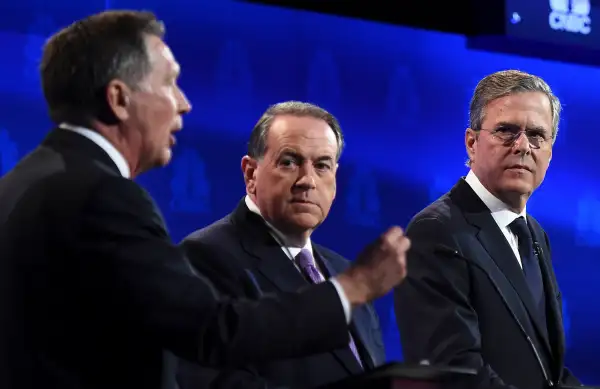Where the 2016 Republican Candidates Stand on College Issues

College-related issues are likely to play a more visible role in the 2016 presidential campaign than in previous years, thanks to widespread concern about tuition costs and student debt.
But despite a CNBC preview that suggested student debt would be a prime question at the third Republican debate, the topic got little attention from candidates Wednesday. Details on their ideas for making college more affordable for families were even thinner than at those at the Democratic debate two weeks ago.

In fact, only three of the candidates addressed the issue at all. Here are their brief comments, along with some background on what they couldn’t—or didn’t want to—say on stage.
John Kasich (Ohio State University, '74)
Well, first of all, in Ohio we’re changing the whole system. Universities will not get paid one dime unless the student graduates or — graduates or completes a course.
Secondly, you can be in high school and complete almost an entire first year before you go to college and get credit to do that. And, of course, in addition to that, we are working now to go after the cost drivers in our universities.”
That was the beginning of Kasich’s answer to a question about how he’d ensure families don’t face a heavy economic burden from college costs for generations to come. (The governor from Ohio was the only candidate to get a direct question about college costs.)
His reference to universities not being paid a dime was a nod to Ohio’s performance-based funding model. The state was one of the earlier adopters of a budget structure that’s now present in some form in about half of states. Ohio, unlike others, ties a lot of money to it (though, not every dime). About 80% of the state money for Ohio's four-year colleges is based on their performance on graduation and course completion rates, according to the National Conference of State Legislatures.
Kasich also mentioned harnessing online education to help drive down costs.
As for the graduates who already have debt? Kasich said he’d support “legitimate” public service loan forgiveness. It’s unclear what he’d define as legitimate, or more importantly, how that’d differ from the public service loan forgiveness program the U.S. already has.
Jeb Bush (University of Texas-Austin, '73)
We don’t need the federal government to be involved in this, because when they do we create a $1.2 trillion debt.
In Florida, we have the lowest in-state tuition of any state, because there’s accountability, just as John said. Let the states do this. You’ll create a much better graduation rate at a lower cost, and you won’t in debt the next generation with recourse debt on their backs.”
Bush’s comment was a direct jab at the proposals of Democratic candidates Hillary Clinton and Bernie Sanders. Both call for significant federal money to go toward making public colleges more affordable. Unsurprisingly, Bush (and Kasich) favor a more state-led approach. Yet one thing neither candidate addressed is how states dramatically cut funding to higher education during the recession and how that coincided with an increase in public college tuition.
Bush said he planned to release a college affordability plan in October, though he hasn't yet. But he's previously said he supports a more market-driven approach to higher education, where colleges are held accountable for graduation rates and student debt burdens. And that while he likes idea of the free community college model in Tennessee, he doesn't think the federal government should support such a program.
(Florida, it also should be noted, does not have the lowest in-state tuition. Though it consistently ranks as one of the most affordable for higher education, the state placed 6th for lowest tuition and fees last year. )
Marco Rubio (University of Florida, '93)
We need to get back to training people in this country to do the jobs of the 21st century. Why, for the life of me, I do not understand why did we stop doing vocational education in America, people that can work with their hands; people you can train to do this work while they’re still in high school so they can graduate ready to go work. But the best way to close this gap is to modernize higher education so Americans have the skills for those jobs.”
Of all the Republican candidates, Rubio has talked the most about higher education, so his lack of details last night about how he’d modernize higher education was somewhat surprising.
Rubio, who mentioned his own student loan bills during the debate, has introduced legislation to create income share agreements as an alternative to student loans. Under those agreements, individuals or organizations would give students money for college, and the students would agree to pay back a percentage of their income for a set period of time after graduation.
Rubio has also said he wants to revamp the accreditation process of colleges to open the door for more innovative, low-cost education and training programs (think online courses or coding bootcamps). And he wants to require colleges to tell prospective students how much they'll earn with a degree after they graduate.
The other candidates in the main debate Wednesday night didn't address higher education, beyond a one-liner from Carly Fiorina (Stanford University, '76) about how she thinks the government created the student loan problem.
But in other campaign events, they've given some attention to higher education issues. Donald Trump (University of Pennsylvania, '68) has said that the federal government shouldn't earn money from interest on student debt, and Ben Carson (Yale University, '73) recently said that colleges should be responsible for paying the interest on the loans their students take out, which would motivate colleges to keep tuition low.
For more college-related advice from Money, check out our College Planner website and Find Your Fit tool, which lets you search for schools based on the factors that are most important to you.
